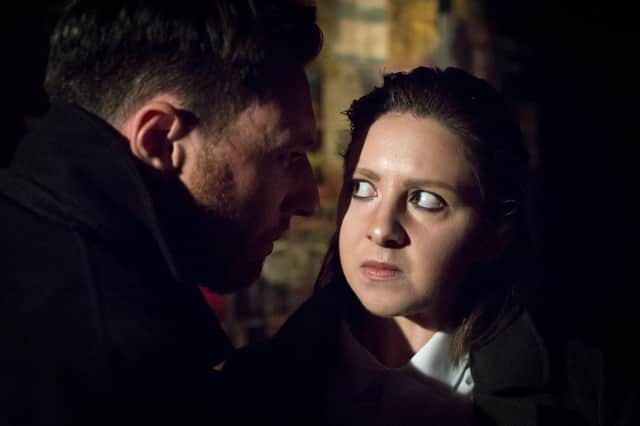Jekyll and Hyde gets a 21st century political makeover as it comes to The Groundlings


But in Arrows and Traps’ reworking of Robert Louis Stevenson’s gothic classic, they aim to take what we think we know, and play with the audience’s expectations.
Moving the action to the present day, the President Of The United States has been impeached for corruption and now awaits trial. As the American senate slides into chaos, election fever grips the nation. In the wake of yet another mass shooting, Senator Henry Jekyll, a bold, young, liberal announces his candidacy to run for the Oval Office.
Advertisement
Hide AdAdvertisement
Hide AdJekyll’s victory seems almost inevitable, however, as voting day draws nearer, Gabrielle Utterson, Jekyll’s campaign manager grows increasingly suspicious of her senator’s running mate – Mister Edward Hyde.
With real life overtaking the play, the company has slightly reworked its own adaptation since it was written and first performed last year.
Producer, Chris Tester, who also plays Hyde, says: ‘Without actually cracking our shoehorns out, we've tried to get a couple of new things in there.
‘It's kind of both miraculous and also depressing that real life seems to have followed very studiously what Ross (McGregor) originally wrote.
Advertisement
Hide AdAdvertisement
Hide Ad‘The whole relocation into the political sphere, that was really drawn from our essential intention, which was really, the problem about staging any version of Jekyll and Hyde now tends to be is even if people don't actually know the novel, they know what the phrase means, if nothing else.
‘If you say someone is a Jekyll and Hyde person, then you know that they are quite two-faced. Back in 1885, when it was originally written that was the big reveal – the big surprise.
‘We wanted to try and recreate that effect, as much as possible, for a contemporary audience on a whole number of levels.
‘The way we've reimagined that is in a very, very different way, so you still don't quite know how things are going to come together.’
Advertisement
Hide AdAdvertisement
Hide AdWithout wanting to give too much away, the play brings Henry and Edward together on stage early on.
‘It’s deliberately deigned to put the audience on the wrong foot. They kind of go: “Oh, okay, but presumably, he’s the same person, so where the hell is this going to go?”
‘And, and that's what we managed to string along hopefully with enough dramatic interest for the next two hours!’
They also switch the gender of Gabriel in the novella to Gabrielle, to bring a little balance to the piece.
Advertisement
Hide AdAdvertisement
Hide Ad‘Gabrielle Utterson is kind of the main character – Gabriel as he is in the original, he's not a deus ex machina as such, but he’s a way of going: “Oh ok, so I'll go and investigate and find out what all of these things are about”.’
‘Again in a kind of 21st century sense, we wanted to rebalance the gender of the piece to a certain degree. In the original novel, I think you have one servant character who basically says: “Yes, Mr Hyde,” and “No Mr Hyde,” and that’s it.
‘It just seemed like a necessary rebalancing thing to have a female narrator.
‘But also, it means you therefore get this kind of mirror – it's not just Henry going on a journey, it's also Gabrielle. In this version she also has her own level of autonomy.
Advertisement
Hide AdAdvertisement
Hide Ad‘It means that the the actual main character of this play actually goes on more of a journey, as opposed to just: “I want to find out what's going on. Oh, this happened.” And then: “Oh, I came across the notebook which explains everything”.
‘The original novel itself is only about 80 pages long and 40 pages of that are: “Then we found this book, and this is what he said...”
‘Without leaning too heavily on, “it's Jekyll and Hyde for the Netflix era”, you want to have that thriller aspect, you want to make sure that there are stakes and that there are risks involved, so it ultimately becomes her narrative.’
Once the political setting had been established, it became a good fit for the themes the company wanted to examine.
Advertisement
Hide AdAdvertisement
Hide Ad‘In the original Victorian setting, it was all these well-to-do gentlemen, and a very male-dominated narrative.
‘But there’s this whole idea of upper class gentlemen who do whatever they can to hide their reputation, and it's all about the dark things that they do under the cover of night.
‘Superficially, their reputation is so drastically important, it’s emphasised in the original so many times, we thought: “What’s the contemporary, modern-day kind of parallel to that?”
‘And the politician seemed like the obvious alternative.
‘Having the character of Henry Jekyll be this politician, being this great hope for the nation; in many ways, being the ideal man, just like the original Henry Jekyll, in the novel was like this kind of exemplar of gentlemanly society.
‘Again we tried to mine that parallel, as well as bring up a new twist at the same time.’
THE STRANGE CASE OF JEKYLL & HYDE
The Groundlings, Portsea
Friday, March 13
Comment Guidelines
National World encourages reader discussion on our stories. User feedback, insights and back-and-forth exchanges add a rich layer of context to reporting. Please review our Community Guidelines before commenting.